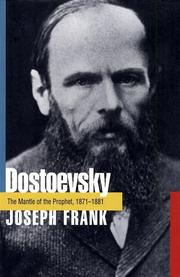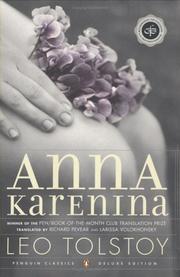| Listing 1 - 7 of 7 |
Sort by
|
Book
ISBN: 1618110039 1936235471 9781618110039 9781618116796 1618116797 1936235188 9781936235476 1936235234 9781936235230 9781936235186 Year: 2010 Publisher: Brighton, Massachusetts : Academic Studies Press,
Abstract | Keywords | Export | Availability | Bookmark
 Loading...
Loading...Choose an application
- Reference Manager
- EndNote
- RefWorks (Direct export to RefWorks)
The renowned Russian writer Leo Tolstoy created a realistic masterpiece in Anna Karenina (1878). In the same work, moreover, he utilized allegory and symbol to an extent and at a level of sophistication unknown in his other works. In Browning's study, the author identifies and analyzes previously unnoticed or only briefly mentioned "linkages and keystones" found in two highly developed clusters of symbols, arising from Anna's momentous train ride and peasant nightmares, and of allegories, rooted in Vronsky's disastrous steeplechase. Within this labyrinth of symbol, allegory and structural patterning lies embedded much of the novel's most significant meaning. This study will be of particular interest to students and scholars of Russian literature, Tolstoy, symbol, allegory, structuralism, and moral criticism.
Book
Year: 1967 Publisher: London : Chatto & Windus,
Abstract | Keywords | Export | Availability | Bookmark
 Loading...
Loading...Choose an application
- Reference Manager
- EndNote
- RefWorks (Direct export to RefWorks)
Book
ISBN: 1644694212 9781644694220 1644694220 1644694204 9781644694213 9781644694206 Year: 2021 Publisher: Boston
Abstract | Keywords | Export | Availability | Bookmark
 Loading...
Loading...Choose an application
- Reference Manager
- EndNote
- RefWorks (Direct export to RefWorks)
This literary, cultural history examines Russian tourism via the prism of cosmopolitanism, pitted against provinciality and nationalist anxiety about the allure of Western Europe. The study's thematic axis sets daunting cultural riches of the West against the compensatory Russian pleasure of playing the "European" colonizer on vacation in "Asia.".
Russians --- Heritage tourism --- Cosmopolitanism --- Tourism in literature. --- Cosmopolitanism in literature. --- Russian literature --- Travelers' writings, Russian --- Travel --- History --- History and criticism. --- Russian travelers' writings --- Political science --- Internationalism --- Cultural tourism --- Tourism --- Ethnology --- Slavs, Eastern --- 19th century. --- Anna Karenina. --- Caucasus. --- Crimea. --- Russian literature. --- Winter Notes. --- art appreciation. --- cosmopolitanism. --- empire. --- nineteenth century. --- social history. --- tourism. --- tourists. --- travel. --- vacation.
Book
ISBN: 0300210795 9780300210798 9780300203943 0300203942 Year: 2014 Publisher: New Haven
Abstract | Keywords | Export | Availability | Bookmark
 Loading...
Loading...Choose an application
- Reference Manager
- EndNote
- RefWorks (Direct export to RefWorks)
Publication of this exacting new translation of Tolstoy's great Anna signifies a literary event of the first magnitude Tolstoy produced many drafts of Anna Karenina. Crafting and recrafting each sentence with careful intent, he was anything but casual in his use of language. His project, translator Marian Schwartz observes, "was to bend language to his will, as an instrument of his aesthetic and moral convictions." In her magnificent new translation, Schwartz embraces Tolstoy's unusual style-she is the first English language translator ever to do so. Previous translations have departed from Tolstoy's original, "correcting" supposed mistakes and infelicities. But Schwartz uses repetition where Tolstoy does, wields a judicious cliché when he does, and strips down descriptive passages as he does, re-creating his style in English with imagination and skill. Tolstoy's romantic Anna, long-suffering Karenin, dashing Vronsky, and dozens of their family members, friends, and neighbors are among the most vivid characters in world literature. In the thought-provoking Introduction to this volume, Gary Saul Morson provides unusual insights into these characters, exploring what they reveal about Tolstoy's radical conclusions on romantic love, intellectual dishonesty, the nature of happiness, the course of true evil, and more. For readers at every stage-from students first encountering Anna to literary professionals revisiting the novel-this volume will stand as the English reader's clear first choice.
Karenina, Anna (Fictitious character) --- Adultery --- Adulterous relationships --- Cheating, Marital --- Extra-marital sex --- Extramarital sex --- Infidelity, Marital --- Marital cheating --- Marital infidelity --- Marriage --- Sex crimes --- Paramours --- Anna Karenina (Fictitious character) --- Russia --- Russie --- Rossīi︠a︡ --- Rossīĭskai︠a︡ Imperīi︠a︡ --- Russia (Provisional government, 1917) --- Russia (Vremennoe pravitelʹstvo, 1917) --- Russland --- Ṛusastan --- Russia (Tymchasovyĭ uri︠a︡d, 1917) --- Russian Empire --- Rosja --- Russian S.F.S.R. --- Russia (Territory under White armies, 1918-1920) --- Social conditions --- Karenina, Anna

ISBN: 9780691115696 0691115699 0691209367 Year: 2003 Publisher: Princeton ; Oxford Princeton University Press
Abstract | Keywords | Export | Availability | Bookmark
 Loading...
Loading...Choose an application
- Reference Manager
- EndNote
- RefWorks (Direct export to RefWorks)
This fifth and final volume of Joseph Frank's justly celebrated literary and cultural biography of Dostoevsky renders with a rare intelligence and grace the last decade of the writer's life, the years in which he wrote A Raw Youth, Diary of a Writer, and his crowning triumph: The Brothers Karamazov. Dostoevsky's final years at last won him the universal approval toward which he had always aspired. While describing his idiosyncratic relationship to the Russian state, Frank also details Doestoevsky's continuing rivalries with Turgenev and Tolstoy. Dostoevsky's appearance at the Pushkin Festival in June 1880, which preceded his death by one year, marked the apotheosis of his career--and of his life as a spokesman for the Russian spirit. There he delivered his famous speech on Pushkin before an audience stirred to a feverish emotional pitch: "Ours is universality attained not by the sword, but by the force of brotherhood and of our brotherly striving toward the reunification of mankind." This is the Dostoevsky who has entered the patrimony of world literature, though he was not always capable of living up to such exalted ideals. The writer's death in St. Petersburg in January of 1881 concludes this unparalleled literary biography--one truly worthy of Dostoevsky's genius and of the remarkable time and place in which he lived.
882 "18" DOSTOEVSKIJ, FEDOR MIHAILOVIC --- Russische literatuur--19e eeuw. Periode 1800-1899--DOSTOEVSKIJ, FEDOR MIHAILOVIC --- 882 "18" DOSTOEVSKIJ, FEDOR MIHAILOVIC Russische literatuur--19e eeuw. Periode 1800-1899--DOSTOEVSKIJ, FEDOR MIHAILOVIC --- Dostoyevsky, Fyodor, --- Pisarze rosyjscy --- Dostojewski, Fiodor --- Dostoevskij, Fëdor Mihajlovič --- Russia --- Intellectual life --- Soviet Union --- Anna Karenina. --- Catechism of a Revolutionary. --- Childhood and Boyhood. --- Crisis in Western Philosophy. --- David Copperfield. --- Downtrodden People. --- Epoch. --- Evgeny Onegin. --- Life of a Great Sinner. --- Little Hero. --- Mimochka. --- Petersburg Almanac. --- Raw Youth. --- Skladchina. --- The Brothers Karamazov. --- The Dream of a Ridiculous Man. --- The Eternal Husband. --- The Landlady. --- The Old Curiosity Shop. --- The Queen of Spades. --- The Tale of the Bear. --- anti-Semitism. --- atheism. --- narodnichestvo.

ISBN: 1101042478 0143035002 Year: 2004 Publisher: East Rutherford : Penguin Publishing Group,
Abstract | Keywords | Export | Availability | Bookmark
 Loading...
Loading...Choose an application
- Reference Manager
- EndNote
- RefWorks (Direct export to RefWorks)
Anna Karenina tells of the doomed love affair between the sensuous and rebellious Anna and the dashing officer, Count Vronsky. Tragedy unfolds as Anna rejects her passionless marriage and must endure the hypocrisies of society. Set against a vast and richly textured canvas of nineteenth-century Russia, the novel's seven major characters create a dynamic imbalance, playing out the contrasts of city and country life and all the variations on love and family happiness. While previous versions have softened the robust, and sometimes shocking, quality of Tolstoy's writing, Pevear and Volokhonsky have produced a translation true to his powerful voice. This award-winning team's authoritative edition also includes an illuminating introduction and explanatory notes. Beautiful, vigorous, and eminently readable, this Anna Karenina will be the definitive text for generations to come.
Married women--Fiction.. --- Adultery--Fiction.. --- Russia--Fiction. --- Married women --- Adultery --- Russia --- Romance fiction, Russian. --- Upper class --- Karenina, Anna --- Social conditions --- Social life and customs --- Love stories, Russian --- Russian romance fiction --- Russian fiction --- Fashionable society --- High society --- Society, High --- Upper classes --- Social classes --- Anna Karenina --- Russie --- Rossīi︠a︡ --- Rossīĭskai︠a︡ Imperīi︠a︡ --- Russia (Provisional government, 1917) --- Russia (Vremennoe pravitelʹstvo, 1917) --- Russland --- Ṛusastan --- Russia (Tymchasovyĭ uri︠a︡d, 1917) --- Russian Empire --- Rosja --- Russian S.F.S.R. --- Russia (Territory under White armies, 1918-1920) --- Romance-language fiction, Russian. --- Romance-language fiction.
Book
ISBN: 1644692651 1644692643 Year: 2020 Publisher: Boston, MA : Academic Studies Press,
Abstract | Keywords | Export | Availability | Bookmark
 Loading...
Loading...Choose an application
- Reference Manager
- EndNote
- RefWorks (Direct export to RefWorks)
Breaking Free from Death examines how Russian writers respond to the burden of living with anxieties about their creative outputs, and, ultimately, about their own inevitable finitude. What contributes to creative death are not just crippling diseases that make man defenseless in the face of death, and not just the arguably universal fear of death but, equally important, the innumerable impositions on the part of various outsiders. Many conflicts in the lives of Rylkova's subjects arose not from their opposition to the existing political regimes but from their interactions with like-minded and supporting intellectuals, friends, and relatives. The book describes the lives and choices that concrete individuals and-by extrapolation-their literary characters must face in order to preserve their singularity and integrity while attempting to achieve fame, greatness, and success.
Authors, Russian --- Death in literature. --- Death --- A Confession. --- About Chekhov. --- Anna Karenina. --- Dante. --- Gogol. --- Liberation of Tolstoy. --- Meyerhold. --- Psychology of Creative Personality;Death;Creativity;Sustainability;Chekhov;Bunin;Tolstoy. --- Russian drama. --- Russian literature. --- The Cherry Orchard. --- The Death of Ivan Ilych. --- The Decembrists. --- The Kreutzer Sonata. --- The Life of Arseniev. --- The Seagull. --- The Steppe. --- Uncle Vanya. --- War and Peace. --- Writer's Block. --- anxieties. --- existentialism. --- hypochondria. --- letters. --- literary theory. --- mortality. --- psychoanalysis. --- psychology. --- the Divine Comedy. --- writing. --- Attitudes. --- Psychological aspects. --- Tolstoy, Leo, --- Criticism and interpretation. --- Bunin. --- Chekhov. --- Creativity. --- Death. --- Psychology of Creative Personality. --- Sustainability. --- Tolstoy. --- Writer’s Block.
| Listing 1 - 7 of 7 |
Sort by
|

 Search
Search Feedback
Feedback About UniCat
About UniCat  Help
Help News
News